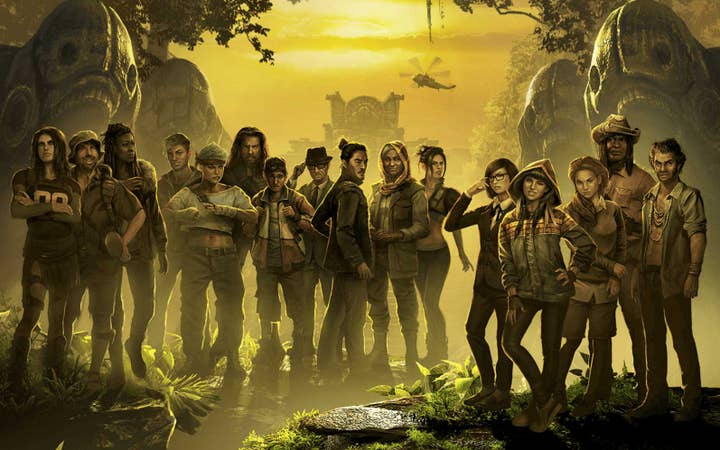The heavy toll of making games in the San Francisco Bay Area
Making games is difficult anywhere in the world -- developers and publishers weigh in on trying to do it in the most expensive place on Earth
San Francisco and its surrounding counties are home to one of the biggest clusters of video game companies in the world. Disruptive startups tend to steal most of the tech headlines, but the sheer amount of video game talent working in Silicon Valley on any given day is staggering. Electronic Arts, Sony, Ubisoft, 2K, Square Enix (through Crystal Dynamics), Activision (through Sledgehammer Games) and Capcom are among the myriad companies with a presence in the region. On top of all that, there's an active independent scene that always seems to be at the forefront of the next great thing in indie gaming.
As with many aspects of life in the San Francisco Bay Area, this proliferation of game companies appears to defy logic. Surely only someone affected by the Jobsian reality distortion field would consider it a viable business decision to start a game studio in a place as oppressively expensive as Northern California. Video games is a cutthroat business; adding to it the level of financial pressure that comes with the ruthless economics of the Bay Area sounds like a recipe for sleepless nights.
"In 13 years we never laid anybody off. It was a hard place to work at, but you always had a job"
Kevin Bruner
And yet, on the surface, the local industry is thriving. So what lies beneath?
What goes up...
There is a grim symmetry to the story of Telltale Games. The studio was born out of major restructuring at LucasArts, which left many employees either out of work or facing the prospect of a long commute to a new office in San Francisco's Presidio, on the other side of the Golden Gate Bridge.
A group of them decided to stay in Marin County instead and try their luck with a new venture. Among them was Kevin Bruner, one of Telltale's co-founders and its CEO between 2015 and 2017. As bitter as his exit from Telltale was, Bruner was devastated to see the studio go bankrupt in October of last year.
"In 13 years we never laid anybody off," Bruner says, speaking to GamesIndustry.biz. "It was a hard place to work at, but you always had a job. We kept you employed and we never missed a payroll. I was really proud of that because behind the scenes there were lean times, where that wasn't always the easiest thing to do."
Upwards of 250 people lost their jobs at Telltale virtually overnight, with no warning from the management. Even in a local industry as large as that of the Bay Area, that's a troubling number of displaced professionals.

To Bruner, Telltale's workforce was more than a statistic. He was gone from Telltale for just 18 months before the collapse, but while he moved on and started a new, much smaller studio, most of the people he worked with were still there when Telltale went under.
"I think they were treated very, very unfairly in a situation that was gonna be bad no matter what. But it could've been handled a lot more elegantly."
Bruner casts the majority of the blame on the company's leadership. It is worth considering whether Telltale's management would have more time to weather the storm and find that more elegant solution if the company was based somewhere cheaper. Some of the local developers I spoke to for this article referred to Telltale's closing as a sign of a troubling change. They worry that if such a big and apparently self-sufficient developer can collapse out of the blue, their prospects might be grimmer than previously expected.
"There were rumors flying around for years that that studio may get shut down because of its cost"
Wright Bagwell
Although reasons matter little when hundreds of people find themselves without a job, the situation appears to have been more clear cut in the case of EA's decision to shutter Visceral Games in November 2017. Wright Bagwell, a former employee of the studio, thinks the decision was purely about cutting exorbitant costs down.
In his nearly two decades working on games in the Bay Area, Bagwell has seen it all -- the highs, where new companies rise and create great products, and the lows, where the same companies collapse seemingly out of nowhere and leave many talented people out of a job. It wasn't until recently, however, that the unique economics of the place were revealed to him entirely.
One of the moments of clarity was the closure of his former workplace. Bagwell had a personal connection to Visceral; his decade-plus at the studio concluded with him leading development on Dead Space 2. As painful as seeing his friends lose their jobs was, Bagwell was struck by something else.
"I was shocked; there were rumors flying around for years that that studio may get shut down because of its cost," he says. "And you think that if anyone should have the money to support an expensive development team, it should be a company like Electronic Arts. Now that's not to say that there weren't other problems at the studio; it's not like everything was perfect there."
That much is difficult to argue -- Visceral never managed to turn Dead Space into a major franchise for EA, and the studio's subsequent bets didn't pay off either. At the end of the day, however, EA made the call on financial grounds, which shook Bagwell's perspective.
"When I heard management at EA saying that cost was a concern, I thought, 'Wow, this is pretty crazy.'"

Show me the money
Another eye-opening moment came when Bagwell left Zynga in 2014, and started pitching his ideas for an ambitious new project. While talking to potential investors, he asked a question some of us may have pondered as well.
"I said to some venture capitalists: 'Don't you think your money is better off being given to places in low-cost areas?' They're going to have a lot more runway and they'll be able to take a lot more risks. They'll have more of a buffer when they hit bumps in the road and when they make mistakes."
It turns out that venture capitalists think in different terms, and this was the response he received: "Your company is 20% to 30% more valuable if you're in the Bay Area because you have so much more access to talent and money, which are the things that startups need. Cost isn't really as much of a factor."
Enter Kristian Segerstrale, who, as an early investor in companies like Supercell, has plenty of experience on that side of the table. Segerstrale is the co-founder of Glu Mobile and Playfish, and his has taken him from his native Finland, through London, all the way to the Bay Area, where he now lives. I ask him whether being based in or near Silicon Valley is an important factor for investors.
"Most game companies would miss out if they had no representation in the Silicon Valley whatsoever"
Kristian Segerstrale
"I think it is a factor," he says. "I do think, though, that most companies that set up here will have -- or certainly should have -- a plan to build on the things which are uniquely different and best in the world here.
"I think most game companies would miss out if they had no representation in the Silicon Valley whatsoever, purely because of the closeness to Apple and Google and everyone else. From my perspective, I would certainly expect a presence here in Silicon Valley to be a really important part of any company's location strategy."
The Bay Area's got talent
With funding secured, every new studio faces the next big obstacle: finding employees. The Bay Area contains the top tech professionals in the world, but securing their services is neither easy nor cheap.
"We ultimately wanted to be a platform company," Bagwell says about Outpost Games, the studio he co-founded in 2014. "We had access to engineers from Silicon Valley, who had built big, scalable backends at companies like Google and E-Trade and Zynga. That talent is easy to find in Silicon Valley, but probably difficult to find elsewhere."
Top talent in these fields also attracts a lot of attention. A hopeful studio owner must compete not only with gaming companies in the area, but also with tech giants with bottomless pockets.
"If you're trying to hire really great engineers as a startup, you simply can't afford to pay some of the insanely high prices that [tech companies] are willing to pay them," says Bagwell. "You have to hire people who are there because they believe in the mission, and hope that if the company does well the stock options will pay off."

Competition for technical experts is good news to those working in those fields. However, there is another subset of the workforce that is just as indispensable to game development, yet has a much harder time making a living in the Bay Area.
"Artists don't demand the same salaries that engineers do," Bagwell says. "I think one of the reasons why it's hard for games to take root here is because half of your team is sort of living at the poverty level -- or at least it feels like they do."
Martin Middleton, a veteran of thatgamecompany and co-founder of the San Francisco-based studio Funomena, has a similar outlook.
"The Bay Area has a specific problem where you need a lot of money to even live modestly, which makes it harder to take creative risks," he says. "But more importantly, it limits who has the financial freedom to pursue games while living here. The choice to focus on games is a lot easier if you have a relatively safe tech job as a backup plan, but that's going to exclude a lot of creative people who aren't as tech-focused, and who could be bringing unique value to the community."
Should I stay or should I go?
"The Bay Area has a specific problem where you need a lot of money to even live modestly"
Martin Middleton
One thing is clear: there are no shortcuts where staffing is concerned. Top talent demands big wages, but there are other ways to sidestep expenses; namely, the notoriously expensive Bay Area rents.
"If you want to be in a prime location, you will need to spend top dollar for studio space," says Mike Roush, CEO of Choice Provisions, the Santa Cruz-based studio of Bit.Trip series fame. "Because startups often had a great deal of VC money, they would pay exorbitant amounts in rent. Landlords knew this, so at times we would see 25% rent spikes. These operating costs ultimately put us at a disadvantage as a smaller studio.
"We ended up closing our San Francisco studio because we could not maintain our burn rate. This was at the beginning of the 'indiepocalypse' as some say, so we had a round of layoffs. We were lucky enough to keep the Santa Cruz office with a skeleton crew."
However, out of that struggle eventually came a solution: "We have closed our doors and opted to be a work-at-home studio. Part of this was due to our employees wanting to live in cheaper areas, and in part because we can get a cheaper workforce out of state."
The employees, Roush says, have embraced the change. One of them has already moved to Seattle -- and Roush suspects that more will follow -- and a couple of new hires live as far away as Minnesota and Canada. Everyone can now happily channel hours that would have been spent commuting into their work. Plus, the reduction in costs have been considerable.
"From when we were at our largest versus where we are now, I think our operating costs are around 20% of where we were in the past," Roush says. "Now, keep in mind that we had 24 employees versus the ten we have now, but these are still substantial savings.
"Ironically, it feels like more of a modern way to run our company, and I believe we are getting more work done faster. So far it feels like the right thing to do."

According to Martin Middleton, Funomena has also opened up to new ways of conducting its business. "We have been adjusting our processes to support more remote development," he says. "Both to give our local team members a break from commuting, and to allow us to collaborate with people from all over the world."
However, while remote development has proved helpful to some studios, most never get past the stage of discussing a move. The consensus seems to be that, for all its money-related downsides, the Bay Area is a great place to live and make games in. Kevin Bruner puts it this way: "It's hard to get established in the Bay Area, but once you've got some roots you want to keep them."
Another thing that everyone I spoke to agrees on is the fantastic community aspect of making games in this part of the world. Moving from such a vibrant melting pot of tech and games could leave valuable opportunities out of reach.
"We would have had a lot more time if we were not here. I'd say anywhere between 20% and 50% more time"
Wright Bagwell
"The Bay Area has always been the central hub for game development," says Bagwell. "This means there are plenty of resources to draw upon. There is a sense that everyone kind of knows each other and this builds community. Making connections and knowing what is happening in the industry, naturally, will put you at an advantage."
The circle of life
Still, most startups -- in gaming or otherwise -- aren't destined to make it and change the world. Nowhere is that reality more evident than in the Bay Area.
Bagwell, who spoke about Visceral's shutdown in terms of a wake-up call, had to contend with shutting his own company at the end of 2018. I spoke to him around the time he finalised the closure of Outpost Games. What went wrong?
"I think we tried to do too much," he says. "We were building a game and we were building a platform; essentially, we were two startups, and the odds are stacked against you as a startup already. We doubled the risk and doubled the challenges."
When the studio's first game, S.O.S., failed to gain traction and provide the revenue Outpost hoped for, things went downhill quickly. Raising money became much harder as the game's audience declined, which caused issues meeting payroll, which ultimately resulted in layoffs.
I ask Bagwell if Outpost Games might have had a better chance at success -- or survival at the very least -- somewhere else.
"Being in the Bay Area had a big effect in the sense that we would have had a lot more time if we were not here," he says. "I'd say anywhere between 20% and 50% more time, just given the fact that we could have outsourced some of our art, or we could have hired engineers in a town where they command a much smaller salary."
But there is always a flipside of setting up shop and ultimately failing in South San Francisco.
"Maybe it wouldn't have happened at all if we weren't here."
